How Teachers Can Cultivate Growth Mindsets Using Assessment
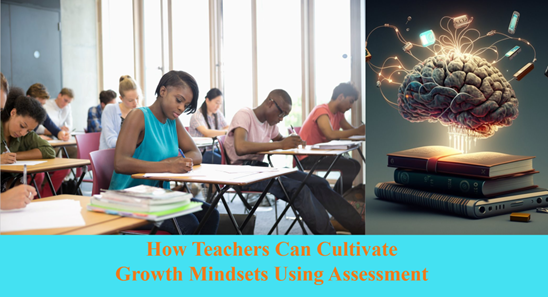
Each spring, Rutgers Alternate Route hosts an insightful Twitter chat addressing growth mindsets and nurturing habits of mind that foster continuous improvement and growth for K-12 students. The online event, open to all program teacher candidates and guest educators, takes place on social media to enable site-wide synchronous communication and interaction with colleagues not affiliated with the program.
This recent Twitter chat features guest education experts familiar with growth mindset research introduced by Stanford University professor Carol Dweck, who studied students' attitudes about failure for more than 30 years. These guests help new teachers explore the impact of a student's mindset on learning while discussing specific ways to cultivate a growth mindset, including strategies for offering feedback to students; language for discussing errors, progress and achievement; and meaningful assessment practices that prioritize learning over grades.
Candidate responses to questions posed during the most recent chat demonstrated clear evidence of their engagement with Dweck's research and their own innate understanding of how to create learning environments where students feel supported.
When the moderator tweeted the final question that addressed assessment, many candidates displayed transparency about feeling challenged in this area. Specifically, they expressed concerns related to assessment rigor, how and whether to grade every assignment, sufficient time for grading student work, and providing substantive feedback to students. They also communicated concerns related to their students' reactions to testing, indicating that some students exhibit test anxiety and lose confidence during exams.
The teachers demonstrated a clear commitment to promoting a growth mindset in their classrooms while also adopting a growth mindset toward improving their own assessment skills.
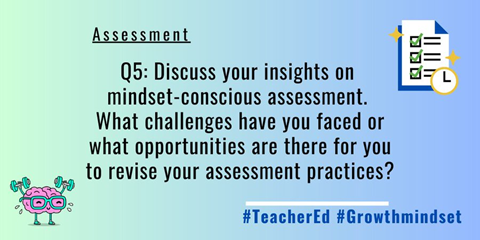
Rigor
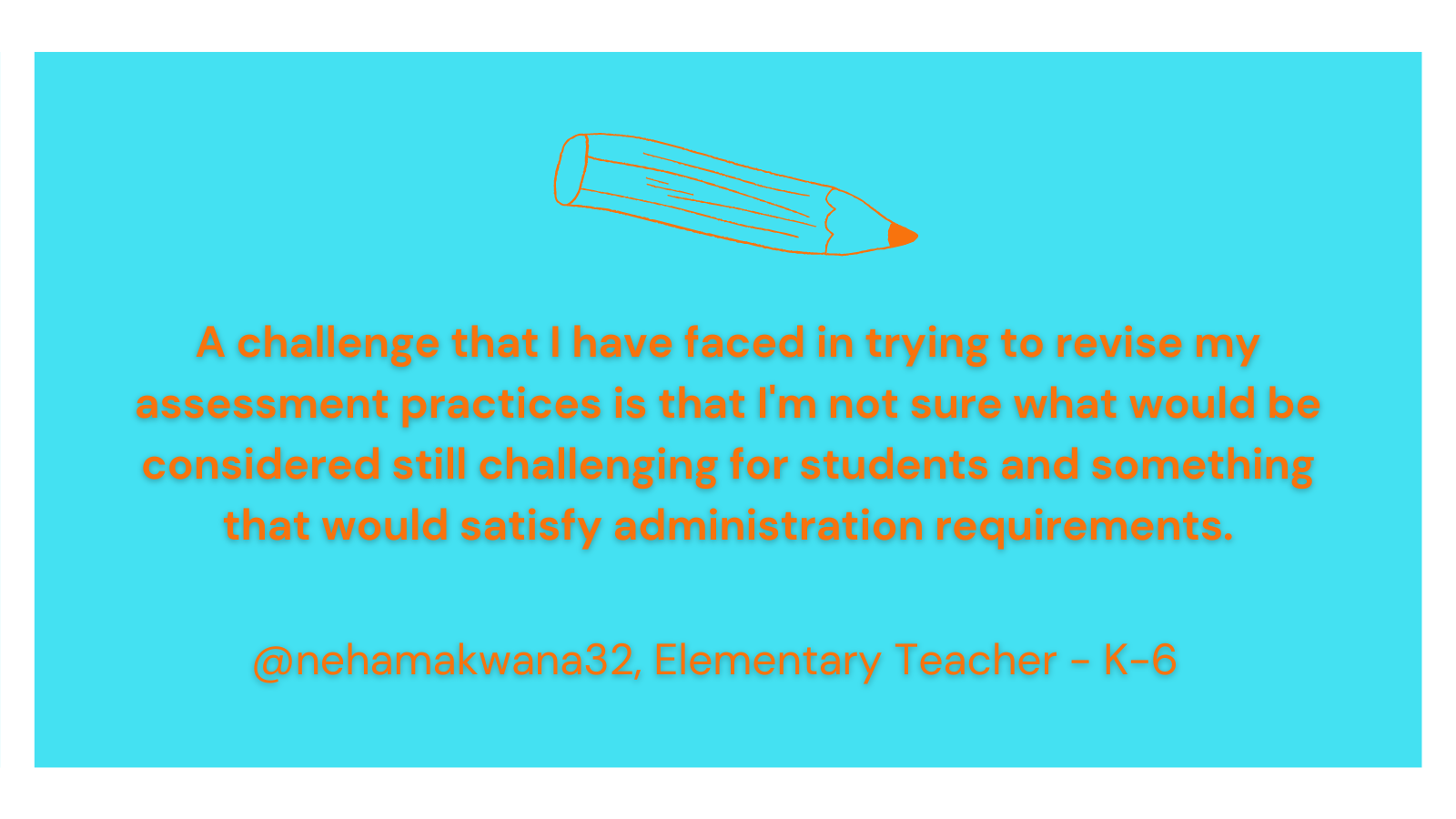
High expectations for every student are at the heart of effective instruction. Teachers must believe every student possesses the potential to succeed in their classes although each may start from varying degrees of understanding or skill level. This involves establishing a single end goal for students which should be skill and content mastery even if timelines and demonstration methods vary. Some teachers sought reassurance in this area.
They shared specific challenges during the chat that we’ve highlighted below:
Students with a history of failing math have a tough time with assessments. To create a growth mindset, I want them to see success for effort, but I struggle to find the balance with promoting student success now and teaching rigor in the standards. - @afwpem, Mathematics Teacher - 9-12
A challenge that I have faced in trying to revise my assessment practices is that I'm not sure what would be considered still challenging for students and something that would satisfy administration requirements. - @nehamakwana32, Elementary Teacher - K-6
A challenge is creating a comprehensive enough assessment that can encompass all of the different learners I teach. The more experience that I have with teaching will allow me to create better assessments that will inform not only me but also students. - @MrBloom_SHS, History Teacher - 9-12
I’ve grown to appreciate diversity in assessments. Formative assessments are great for “checking comprehension” but all too often are set up as “multiple-choice” or “short answers” that can be memorized (meaning, students learn nothing). - @ty179b, History Teacher - 9-12
As an educator, creating cognitively demanding and meaningful assignments is crucial for engaging students and facilitating their learning. Teachers can make assignments more challenging while promoting deep understanding. They do so by establishing clear learning objectives—including what knowledge, skills, or concepts students should be able to demonstrate in their work samples or on tests. This encourages critical thinking skills by limiting simple recall-based questions and requiring students to apply knowledge to real-world scenarios, as well as make connections between different concepts, and engage in problem-solving activities. Additionally, engaging students in metacognitive tasks that ask them to write reflections on their problem-solving strategies or to evaluate their own work is effective. All of these strategies can increase rigor and promote deep learning.
Grading Every Assignment
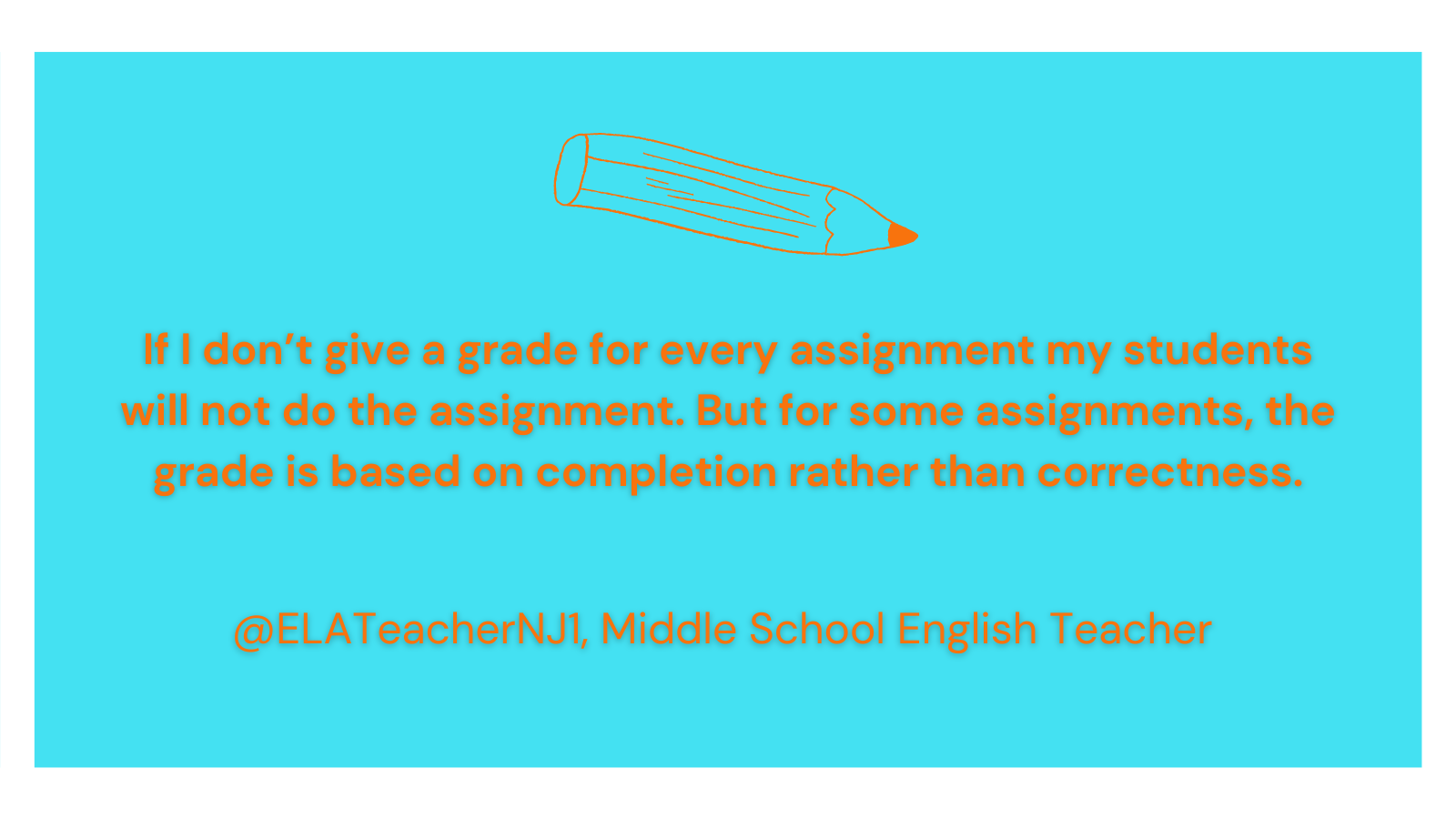
There is an overwhelming assumption among teachers that if they don't grade assignments, students will not complete them or invest the appropriate effort. Consequently, many teachers grapple with the question of what assignments to grade because the process, while important, is very time-consuming.
Teachers expressed the following concerns related to managing grading.
A challenge I've faced is feeling like I need to grade every assignment. I will be revising my assessment strategy by focusing on providing specific feedback that is aimed at improvement, and deepening understanding, rather than giving fixed grades. - @ZashaSan3, Elementary Teacher - K-6
The challenge is that I need to grade each student’s assignment because I see them once a week. But I do make the standards transparent, I do allow second chances. I am always willing and happy to see that a student wants to learn it and tries again. - @iakubtsiv, Elementary Teacher - K-6
If I don’t give a grade for every assignment my students will not do the assignment. But for some assignments, the grade is based on completion rather than correctness. - @ELATeacherNJ1, Middle School English Teacher
Teachers must learn to prioritize grading and feedback for key assignments. Deciding which student assignments to grade should consider the purpose of the assignment. For example, homework or independent practice assignments are intended to help students learn new material. Grading work during a practice phase may have adverse effects on students who require more time to grasp a new concept. They may feel anxious about making mistakes, which undermines the development of a growth mindset and the idea that mistakes are part of the learning process. To this end, limiting grading to key assessments and finished products may be the best way to balance the desire to provide meaningful feedback and manage a reasonable workload.
Sufficient Time
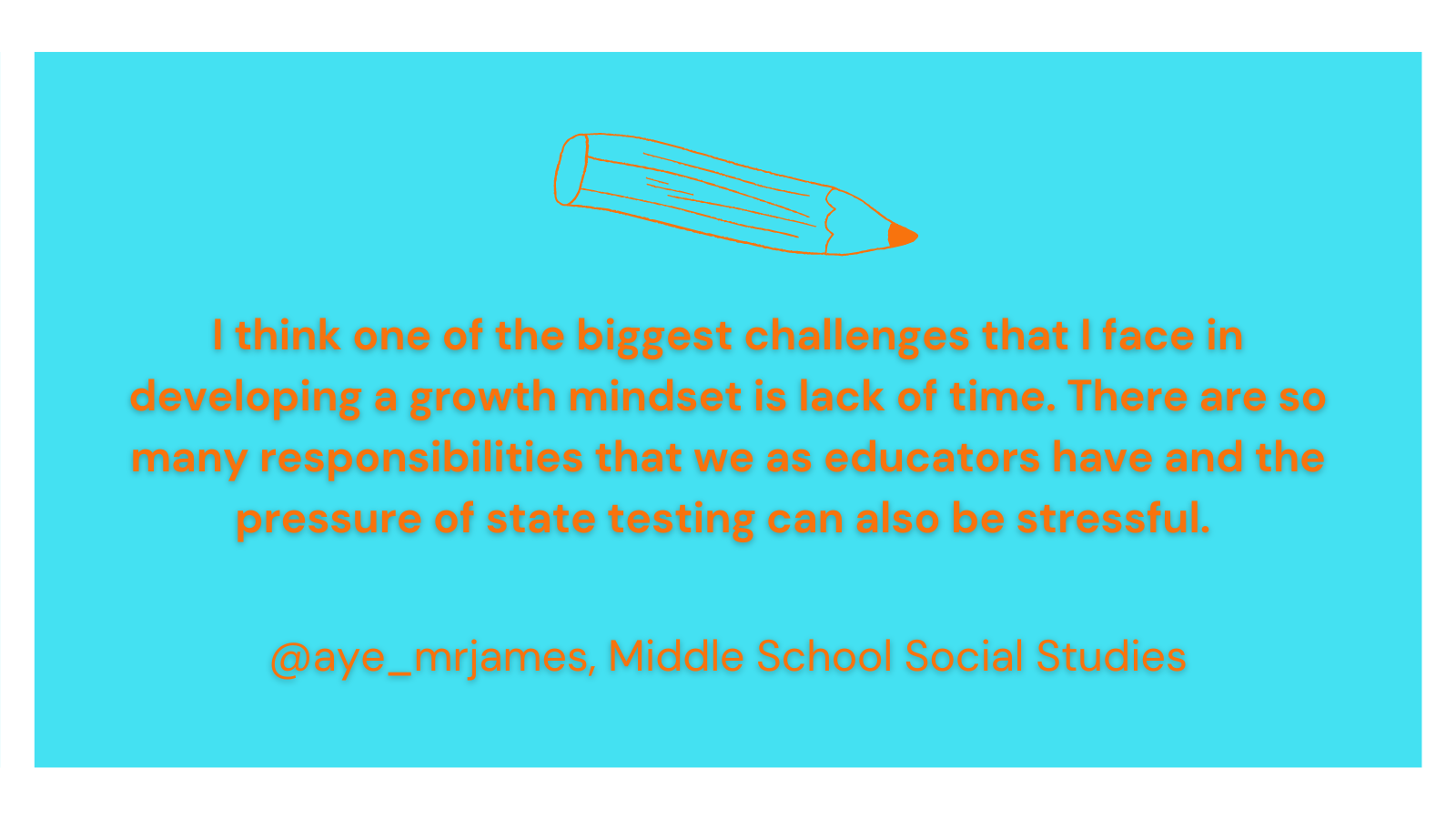
Teacher responses also revealed tremendous challenges related to time constraints. Heavy workloads, large class sizes, and the need to balance teaching with administrative tasks all complicate a teacher's schedule and create challenges in finding time for grading assessments. These teacher tweets demonstrate their challenges in navigating time.
I think one of the biggest challenges that I face in developing a growth mindset is lack of time. There are so many responsibilities that we as educators have and the pressure of state testing can also be stressful.
- @aye_mrjames, Middle School Social Studies
My biggest challenge is really time. I have 15 students and doing 1-1 assessment reviews with them every week takes up a good chunk of my Friday. However, it is worth it to see the willingness to fix the mistakes and grow from them are worth it.
- @missgerstle, Elementary Teacher - K-6
Since assessment is a critical part of the teaching process and is necessary for identifying student progress, planning future lessons, and providing feedback to students, overcoming time challenges is critical. Strategies for doing so could include things like setting aside specific times for assessing student work, using technology tools to save time on grading, and asking students to self-assess some of their work.
Substantive Feedback
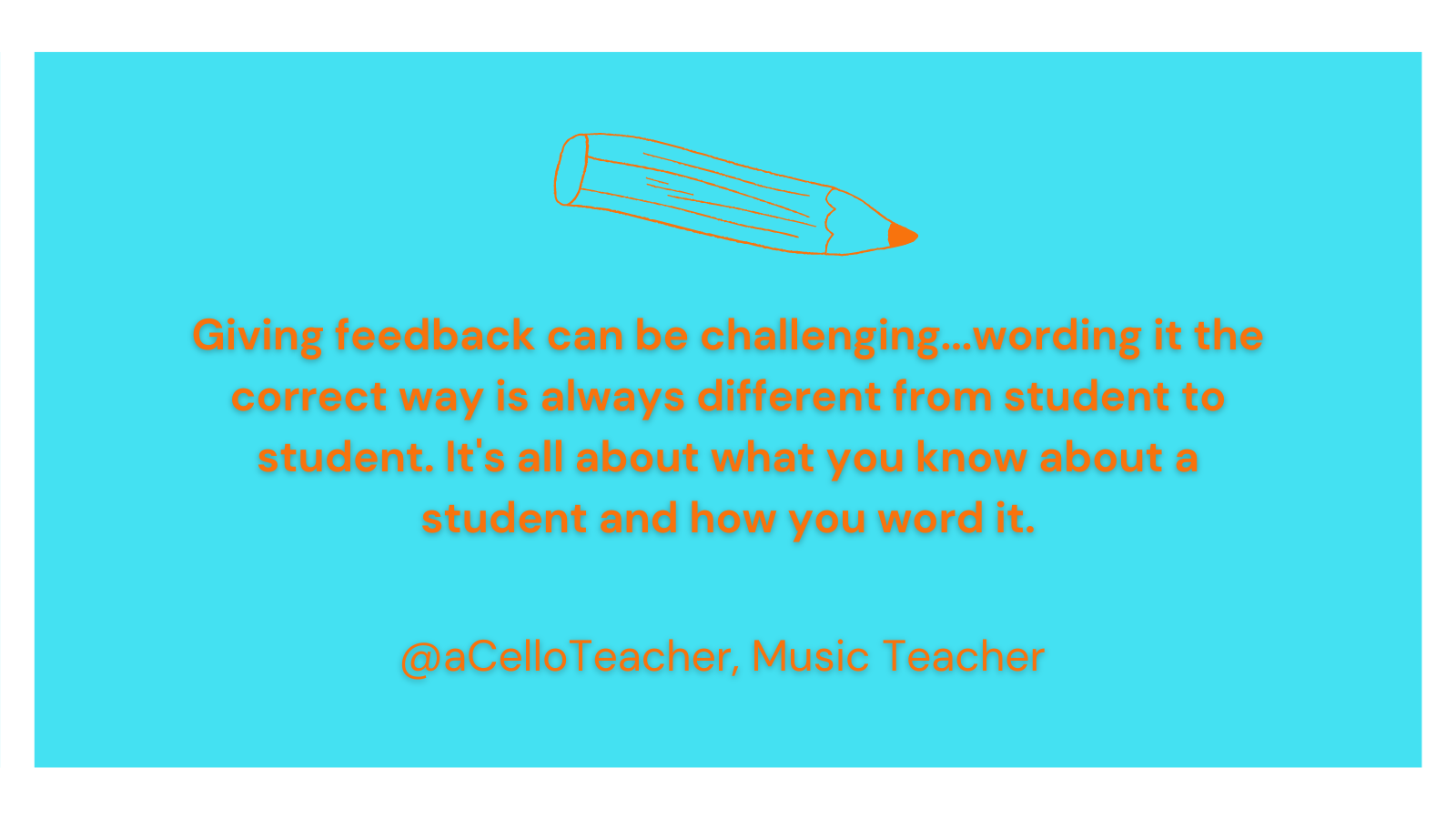
Providing substantive feedback is essential for student learning and growth. Unfortunately, teachers struggle in this area largely due to limited time and lack of practice. Nevertheless, developing competencies for providing specific, actionable feedback that help students improve their understanding of a concept is very important for effective teaching.
I need to give more details in my feedback. Instead of single words (excellent, better), I need to write more, like, "Your effort is obvious, getting better & closer. See me so we can work on this, and we'll take this assessment again." - @lance_privetera, Middle School Math Teacher
Giving feedback can be challenging...wording it the correct way is always different from student to student. It's all about what you know about a student and how you word it. - @aCelloTeacher, Music Teacher
Some practical strategies that teachers can use to provide substantive feedback to student include being clear about learning objectives and expectations, focusing on specific strengths and weaknesses of the student's work, providing concrete examples to illustrate points, offering suggestions for improvement that are both specific and actionable, encouraging students to reflect on their own work or conduct peer-reviews and identify areas for improvement, and using technology tools to provide feedback efficiently and effectively.
Test Anxiety and Student Confidence
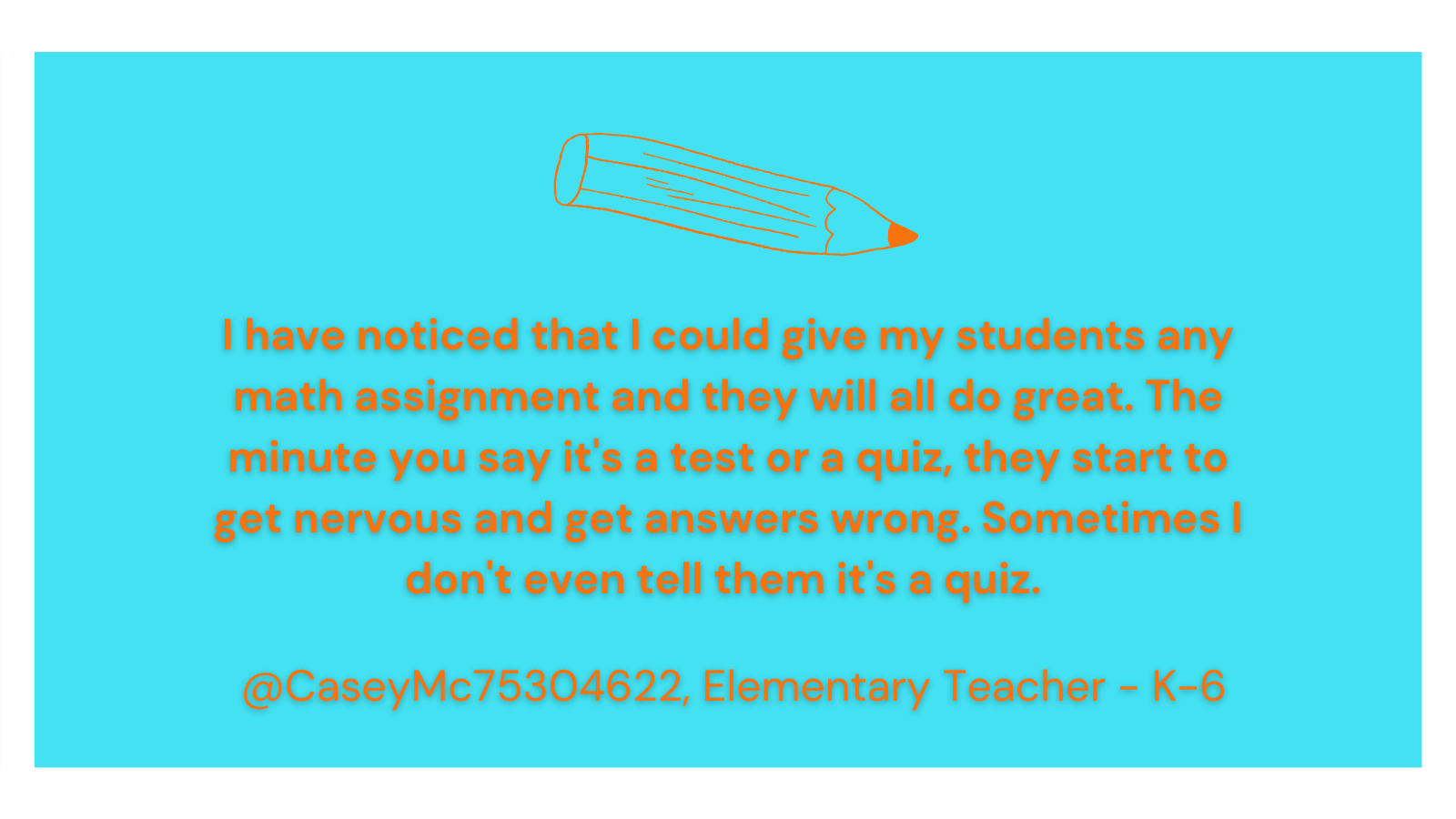
Test anxiety is a common issue among students and can negatively impact their performance. Even high achieving students can struggle with test anxiety. Some students experience test anxiety because they are afraid of failure or fear disappointing their teachers and parents. In some instances, test anxiety is linked to lack of preparedness due to poor study skills or intimidating testing environments. Many new teachers in our program have witnessed first-hand the effects of test anxiety in their classrooms.
I have noticed that I could give my students any math assignment and they will all do great. The minute you say it's a test or a quiz, they start to get nervous and get answers wrong. Sometimes I don't even tell them it's a quiz.
- @CaseyMc75304622, Elementary Teacher - K-6
One of my challenges is definitely the lack of confidence some of my students have. They get upset if they get something wrong, for example: if they get a few multi-choice questions wrong they think it’s a reflection of themselves.
- @Roym29661481m, Health & Physical Education Teacher
Some difficulties I’ve faced are having students believe they can’t do something and not putting in the effort because they think they’ll perform poorly anyway. Something I can change is encouraging them more and further breaking down lessons. - @meg_jacobz, English Teacher - 9-12
Left unchecked, the effects of test anxiety can take a toll on students, resulting in lower grades and diminished mental health. Fortunately, there are methods teachers can use to aid students in managing their test anxiety. Strategies that help include recognizing the signs, teaching effective study habits, providing a supportive classroom environment, encouraging relaxation techniques, and providing positive feedback. Reducing test anxiety is an ongoing process, but students can conquer it with support from knowledgeable teachers and the wealth of available resources targeting this issue.
Based on teacher responses during our Twitter chat, assessment plays a significant role in helping students develop a growth mindset based on a belief they can transcend challenges and expand their own abilities through effort and persistence. To set more students on a path to a growth mindset, teachers might enhance their assessment practices to include offering diagnostic feedback without a grade attached to help students focus on how to improve rather than on their numerical scores. Similarly, incorporating more formative assessments that check for comprehension and don't count for grades can help students develop a growth mindset by directing their attention to learning and making progress while providing guidance for improvement. Finally, teachers can encourage a growth mindset through assessment by building revision tasks into their learning activities, providing feedback that focuses on improvement, and assigning proof of improvement requirements following tests, exams and graded written assignments.
To learn more about growth mindset, review the Wakelet, which curates the responses and resources from our Alternate Route teacher candidates and expert guest commentators.
If you’re considering following your dream of teaching, Rutgers Alternate Route can offer you the support and training you need to succeed. Be sure to follow Rutgers Alternate Route on Twitter and sign up for Alternate Route’s monthly newsletter for more information and stories from the field of education.

 Heather Ngoma has over 25 years of experience collaborating with educators across New Jersey to drive education innovation. She currently serves as the Director of the Rutgers-GSE Alternate Route Program in the Department of Learning and Teaching, a program which helps career changers, recent college graduates, and other aspiring education professionals become licensed teachers in New Jersey. Follow her on Twitter @heatherngoma.
Heather Ngoma has over 25 years of experience collaborating with educators across New Jersey to drive education innovation. She currently serves as the Director of the Rutgers-GSE Alternate Route Program in the Department of Learning and Teaching, a program which helps career changers, recent college graduates, and other aspiring education professionals become licensed teachers in New Jersey. Follow her on Twitter @heatherngoma.





